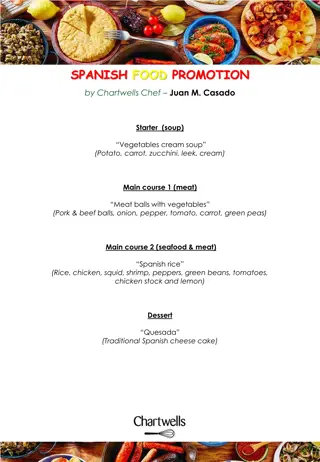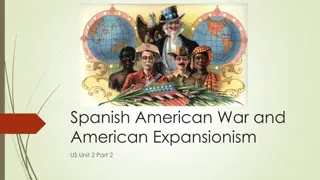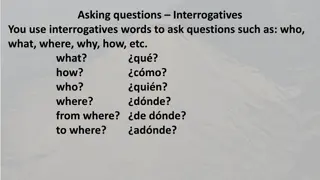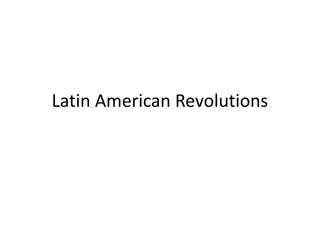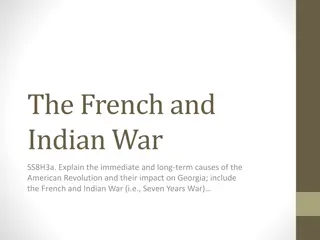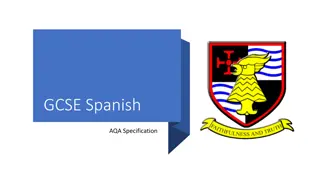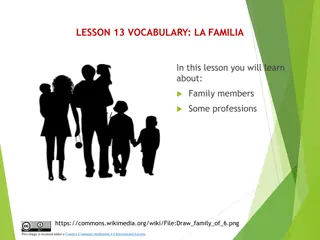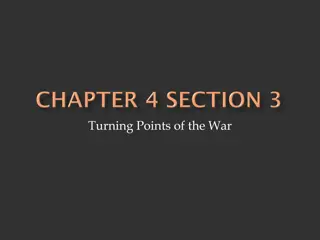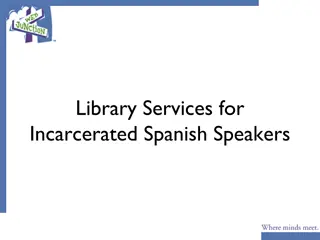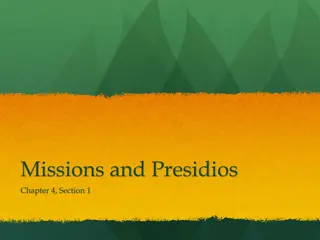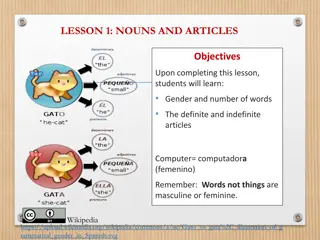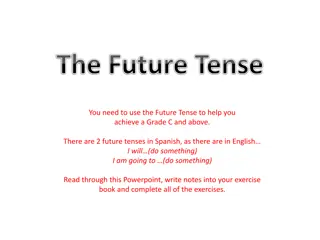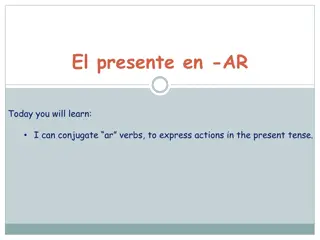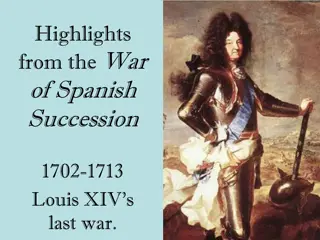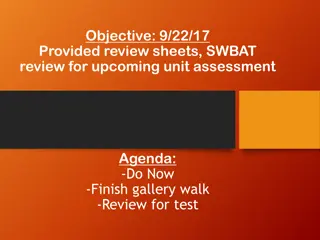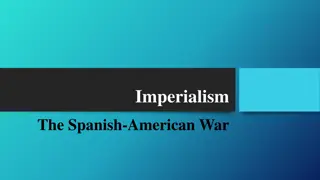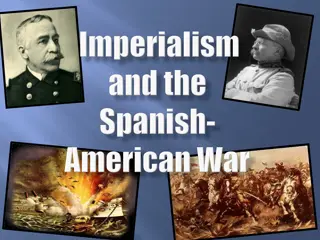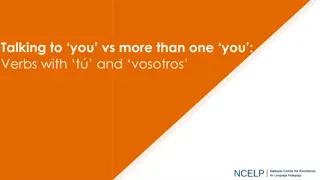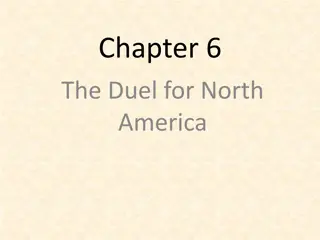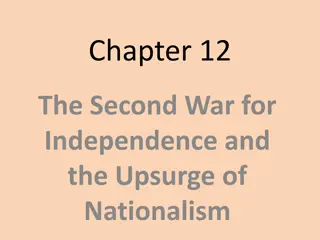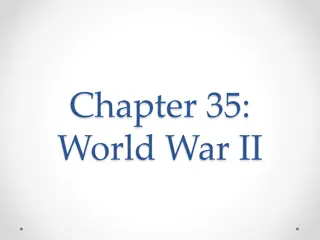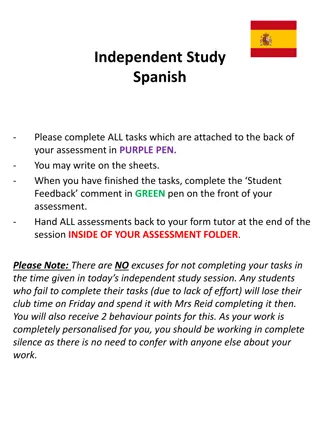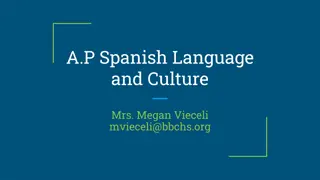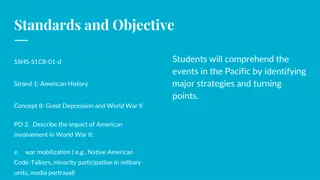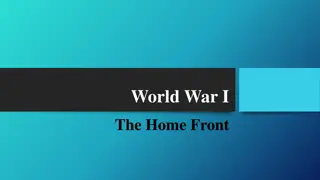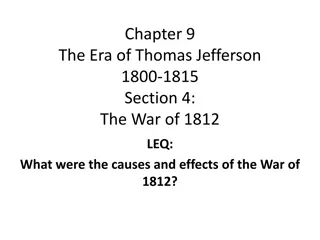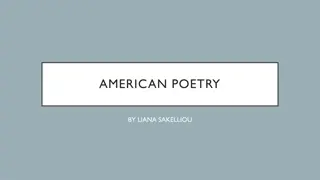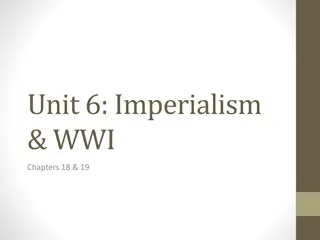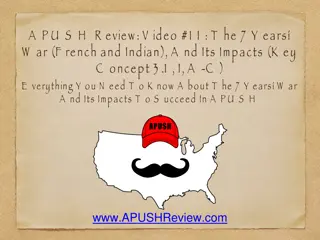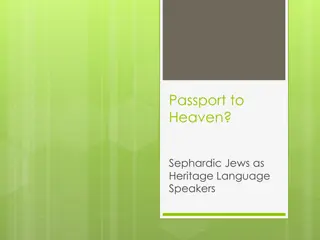❤[PDF]⚡ Civil War Talks: Further Reminiscences of George S. Bernard and His Fel
\"COPY LINK HERE ; https:\/\/getpdf.readbooks.link\/0813931754\n\nRead ebook [PDF] Civil War Talks: Further Reminiscences of George S. Bernard and His Fellow Veterans (A Nation Divided: Studies in the Civil War Era) | Civil War Talks: Further Reminiscences of George S. Bernard and His Fellow Vetera
1 views • 6 slides
The American Soldier: Studies in Social Psychology in World War II
In the book "The American Soldier: Studies in Social Psychology in World War II," published in the United States between 1949 and 1950, research on the morale and attitudes of American troops during World War II is examined. The research project was initiated by the Army's Information and Education
4 views • 18 slides
Explore the Vibrant World of Spanish Classes in San Diego
Embark on a journey to master the beautiful Spanish language right here in San Diego with Culture & Language Center. Our Spanish classes in San Diego offer an immersive experience where you'll not only learn the language but also delve into the rich culture and heritage of Spanish-speaking countries
2 views • 7 slides
Spanish Food Promotion by Chef Juan M. Casado
Indulge in a delightful Spanish culinary experience crafted by Chartwells Chef Juan M. Casado. Start with a creamy Vegetable soup, followed by savory Meatballs with a blend of Pork and Beef, and a tantalizing Spanish Rice infused with chicken, squid, and shrimp. End your meal with a decadent Quesada
0 views • 5 slides
The Homefront: U.S. War Production Efforts During World War II
During World War II, the United States mobilized its industries for total war production, converting peacetime factories into facilities for producing planes, tanks, rifles, and more. The U.S. became the Allies' biggest armaments supplier, producing millions of war supplies and significantly boostin
2 views • 25 slides
Spanish-American War and American Expansionism: A Look Back in History
Explore the causes and impacts of the Spanish-American War, including the influence of Yellow Journalism, nationalism, and imperialism on American expansionism during the late 1800s. Learn about key figures like Theodore Roosevelt and the Rough Riders, and the significance of policies like the Monro
0 views • 25 slides
Origins of the Cold War: Yalta and Potsdam Conferences 1945
The Cold War's origins stem from the tensions and suspicions between the USSR and the West post-World War II, highlighted through conferences like Yalta and Potsdam. At the Yalta Conference, held in February 1945, crucial decisions were made regarding Germany, Poland, and the UN. The Potsdam Confere
0 views • 10 slides
Spanish Interrogatives: Asking Questions and Sentence Structure
Interrogative words in Spanish are used to ask questions, such as who, what, where, why, and how. When forming questions, the verb is placed before the subject in Spanish. Additionally, the placement of interrogatives changes when asking for confirmation or denial. Learn more about asking how much a
0 views • 6 slides
Latin American Revolutions: Causes, Events, and Impact
Latin American Revolutions from 1791 to 1825 marked a period of significant upheaval as colonies in the Western Hemisphere sought independence from Spanish rule. Driven by factors like inspired by other successful revolutions, Spanish mercantilist policies, and unequal wealth distribution, these rev
1 views • 12 slides
Insights into World War Two and Adolf Hitler's Role
World War Two started on September 3, 1939, with Britain and France declaring war on Germany. Adolf Hitler's rise to power, initiation of the war, and involvement in the Holocaust are highlighted. The Star of David symbolized Jewish identity under Hitler's rule, and the Holocaust saw six million Eur
0 views • 6 slides
Causes and Impact of the French and Indian War on the American Revolution
The French and Indian War was caused by disputes over land and power between France and Great Britain, leading to a nine-year conflict that began in 1754. Tensions escalated as both countries claimed the Ohio River Valley, a key frontier region. The war had significant immediate and long-term impact
0 views • 17 slides
Washington Irving: Father of American Fiction and Pioneer of American Romanticism
Washington Irving, an influential American author of the early 19th century, is revered as the Father of American fiction. Known for iconic works like "The Legend of Sleepy Hollow" and "Rip Van Winkle," Irving played a crucial role in establishing American literature as an independent art form. His
1 views • 14 slides
Exploring the Benefits of Learning Spanish: GCSE Spanish AQA Specification Overview
Discover the reasons to study another language, with a focus on Spanish through insights on cultural awareness, improved memory, career prospects, and more. Dive into the global significance of the Spanish language, assessment details for GCSE students, and the diverse topics covered, from local iss
0 views • 12 slides
Analysis of W.B. Yeats' Poetry During World War I
W.B. Yeats' poetry during World War I reflects a unique perspective on the conflict, as seen in works like "An Irish Airman Foresees His Death" and "On Being Asked for a War Poem." Delving into themes of sacrifice, duty, and the futility of war, Yeats offers a contrasting view to the graphic realism
0 views • 7 slides
Vocabulary and Professions in Spanish: La Familia
This lesson covers vocabulary related to family members and professions in Spanish. Learn about family members such as madre (mother), padre (father), hijo/a (son/daughter), and professions like enfermero (nurse) and abogado (lawyer). Explore the changing concept of family in Spanish-speaking countr
0 views • 6 slides
Turning Points of the American Revolutionary War
The American Revolutionary War saw key turning points including battles like Trenton and Saratoga, harsh winters at Valley Forge, and the final victory at Yorktown. Factors contributing to the Patriots' win were British underestimation, political nature of the conflict misunderstanding, high Patriot
0 views • 9 slides
Understanding Weather Expressions in Spanish Vocabulary
Learn how to use different weather expressions in Spanish, including idiomatic phrases like "Hace calor" (It's hot) and "Está nublado" (It's cloudy). Understand the nuances of expressing weather conditions in Spanish and the importance of idiomatic language. Master key phrases for talking about wea
0 views • 7 slides
Spanish Language Outreach Program for Incarcerated Spanish Speakers
The Spanish Language Outreach Program provides valuable resources and guidance for library staff aiming to better serve Spanish speakers in correctional facilities. Developed in partnership with the Bill & Melinda Gates Foundation, the program focuses on enhancing the skills of library staff to cate
0 views • 68 slides
Texas Mission-Presidio System: Spanish Control Efforts in Texas
Amid fears of losing control to the French in Texas, Spain implemented the mission-presidio system to establish settlements, convert Native Americans to Christianity, and make them loyal Spanish subjects. Friars played a key role in teaching Indigenous peoples about Christianity, Spanish language, a
0 views • 31 slides
Basics of Spanish Nouns and Articles
This lesson introduces the fundamental concepts of gender, number, and articles in the Spanish language. Students will learn about the gender and number of words, definite and indefinite articles, as well as rules for forming the feminine of nouns. The chapter covers the usage of definite articles i
0 views • 7 slides
Mastering the Future Tense in Spanish
Learn how to use the future tense in Spanish to improve your language skills and achieve better grades. Explore the two future tenses in Spanish, the near future structure with "ir + infinitive," and the simple future with verb endings. Practice translating sentences to and from Spanish to strengthe
0 views • 9 slides
Mastering Present Tense Conjugation of -AR Verbs in Spanish
Dive into the world of conjugating -AR verbs in Spanish to express actions in the present tense. Learn about the fundamental parts of Spanish verbs, including the infinitive, ending, and stem. Discover how to conjugate regular -AR verbs like hablar (to speak) through detailed explanations and verb c
0 views • 36 slides
The Impact of the Korean War on Global Relations
The Korean War, often dubbed the "Forgotten War," had significant implications on global politics and relationships. This conflict was characterized by a mix of conventional and guerilla warfare tactics. China's involvement in the war had a profound impact on its relations with the U.S. and the U.S.
0 views • 14 slides
Insights from the War of Spanish Succession (1702-1713)
The War of Spanish Succession (1702-1713) marked Louis XIV's final war, reflecting a complex political landscape in Europe. The conflict arose due to the declining power of Spain, with the last Hapsburg monarch, Charles II, facing challenges of inbreeding and mental deficiencies. The struggle for co
0 views • 20 slides
Unit Assessment Review: U.S. Imperialism History Lesson
Review session for upcoming history unit assessment on U.S. Imperialism. Topics covered include key events such as the Philippines under American control, reasons for Mark Twain's anti-Imperialist stance, factors driving American foreign policy towards imperialism, the case of Hawaii's Queen Liliuok
0 views • 15 slides
Causes of the Spanish-American War: Imperialism, Cuba, and Yellow Journalism
The Spanish-American War was fueled by imperialism, particularly the desire for colonies, as well as the unrest in Cuba against Spanish rule. American economic interests in Cuba, coupled with yellow journalism's sensationalized reporting, further escalated tensions leading to the conflict.
0 views • 25 slides
The Spanish-American War: Origins and Impact
The Spanish-American War was fueled by a combination of factors including economic struggles, imperial ambitions, and sensationalist journalism. Theodore Roosevelt's stance on war, coupled with the desire for Cuba's independence from Spain, led to a call for war in the late 1890s. Yellow journalism
0 views • 18 slides
Spanish Verb Endings for Addressing One Person vs. Multiple People
Spanish uses different verb endings for addressing one person (tú) and multiple people (vosotros). This resource provides examples of regular Spanish verbs with endings for one person and more than one person, as well as exercises to practice identifying the correct verb forms. Visual aids and enga
0 views • 21 slides
The Duel for North America: France's Colonization Efforts
France, like England and Holland, was a latecomer in the race for North American colonies. King Louis XIV took an interest in overseas territories, leading to the establishment of Quebec in 1608. Samuel de Champlain played a key role in French colonization efforts, forging alliances with Native Amer
0 views • 20 slides
The War of 1812: A Historical Overview
The War of 1812 was a significant conflict in American history marked by numerous challenges and battles. Despite initial setbacks and disunity, American victories such as the Battle of New Orleans and the defense of Fort McHenry showcased resilience and determination. The Treaty of Ghent brought an
0 views • 18 slides
World War II Home Front Contributions and Impact
The chapter highlights the significant roles played by various groups during World War II on the home front. It covers topics such as the Selective Service Act, War Productions Board, women in the workforce, African Americans' contributions, Native American code talkers, Mexican-American involvement
0 views • 11 slides
Spanish Verbs and Opinions Task for Improvement
This independent study task focuses on improving Spanish language skills related to verbs and opinions. Students are required to translate sentences about personal information and express preferences using proper Spanish grammar and vocabulary. The task emphasizes correct usage of verbs in the 1st a
0 views • 18 slides
Exploring AP Spanish Language and Culture: What to Expect and Is It Worth It?
This guide provides insights into AP Spanish Language and Culture, focusing on communication skills, exam pass rates, workload, and the course's value. Discover what to expect, the emphasis on communication skills, exam pass rates, workload breakdown, and whether AP Spanish Language is a worthwhile
0 views • 11 slides
Impact of American Involvement in World War II Pacific Theater
Explore the pivotal events in the Pacific Theater of World War II, including the fall of the Philippines, the harrowing Bataan Death March, the strategic Doolittle Raid, and the crucial role of Navajo Code Talkers. Delve into the war mobilization efforts, reflecting on the bravery and sacrifices mad
0 views • 16 slides
America's Role on the Home Front during World War I
During World War I, America witnessed significant changes on the home front as the government took on new powers to regulate industry, agriculture, and public opinion. Women and minorities played crucial roles, voluntary rationing was embraced, and opposition by conscientious objectors was met with
0 views • 24 slides
The War of 1812: Causes, Events, and Effects
The War of 1812 was influenced by issues such as British impressment of American sailors, arming Native Americans, and trade restrictions. Despite opposition, President James Madison declared war in 1812. The conflict marked a period of American nationalism, with War Hawks pushing for war and Doves
0 views • 16 slides
American Literature Through the Ages
Explore the rich tapestry of American literature covering American Indian culture, New England Puritanism, the 18th century American Enlightenment, and the American Renaissance. Discover the oral traditions of American Indian tribes, the puritanical values of New England, the democratic origins of A
0 views • 17 slides
United States Foreign Policy Evolution from Imperialism to World War I
Explore the United States' foreign policy evolution from Imperialism to World War I, including the Open Door Policy, Dollar Diplomacy, and involvement in the Spanish-American War. Learn about the military actions in acquiring territories such as Puerto Rico, Guam, Philippines, and Hawaii. Delve into
0 views • 8 slides
Understanding the Impact of the French and Indian War on American History
The French and Indian War, lasting from 1754-1763, had significant consequences on the American colonies. It intensified the rivalry between Britain and France, led to Britain acquiring French territory, and resulted in major debt for Britain. The war's aftermath saw the end of salutary neglect and
0 views • 7 slides
Exploring Spanish Citizenship for Sephardic Jews: Language and Culture Requirements
The Law 12/2015 grants Spanish citizenship to descendants of Sephardic Jews, emphasizing language and culture proficiency through exams such as DELE A2 and CCSE. The presentation delves into the impact of Law 1/10/2015, the dissonance between Judeo-Spanish and modern Spanish proficiency requirements
0 views • 40 slides
![❤[PDF]⚡ Civil War Talks: Further Reminiscences of George S. Bernard and His Fel](/thumb/20551/pdf-civil-war-talks-further-reminiscences-of-george-s-bernard-and-his-fel.jpg)


